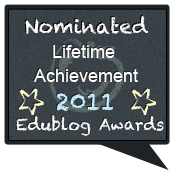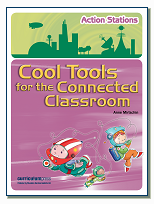The two week autumn break means that I have time to catch up on reading others’ blogs and posting on myown blog. One blog I like to follow, but have not looked at since the beginng of term 1, is the Edublogger, by editor Sue Waters. This blog post on whether students should follow formal style, ensure accurate spelling and appropriate grammar caught my eye and here is my response to Sue’s questions. Do you agree?
- Should teachers be correcting grammar and spelling in student posts and comments? If you are correcting, how are you doing this?
This is a difficult question to answer. As I am an ICT (Information and Communications Technology teacher), I usually only correct spelling and grammar for those students who ask me to do so or where I detect an almost illegible post. Having said that, students are encouraged to write their post in MS Word, first, and use a spell checker before pasting in the “paste from Word” icon on the blog post editor, or are asked to use the spell checker that exists within the blog editor. I would much prefer students to enjoy writing and put something up than to spend a lot of time correcting work and not posting it. As there are often 25 students in my class, it is almost impossible to get around them all. One of my premises, is that blogging improves student writing, spelling etc and having a starting point, I can gauge over the year whether this has occurred. I do remember having parent/teacher interviews and showing one parent her child’s blog posts. She was so horrified with the spelling mistakes (even though it was phonetic enough to understand) that she sat in my room with her grade 6 son for 30 mins helping him correct his work! If we are cross posting with students who speak English as their second language, I do try and check those students whose spelling and grammar is poor as the translator will not pick up the meaning of the post.
I have devised a rubric to assess student blogs for reporting purposes and spelling and the message of their blogging is one of these criterion. I will speak to the student on an individual basis should a post be really poor and get them to correct it themselves.
As an aside, I have found that students, especially in the primary years, on the whole, do want their work to look good and be spelt correctly.
2. Is a formal structure or style for writing posts and comments necessary? Refer to Kathleen McGeady’s guest post Teaching Commenting Skills to see what we mean by formal structure. This is a fabulous post and thanks Katherine for sharing it.Is student age an important consideration?
I do believe that age is an important consideration. I encourage students to share their stories as we all love to read stories. Therefore, blogging is storytelling and not really formal writing. As I teach ICT, and as we have other class commitments, students do not have the time to spend on writing formal comments. They are encouraged to read the other student post, add a comment and ask a question. I like comments to sound like a conversation, so that connections can begin or maintained. I do insist on no txt messaging or IM as this is not good netiquette and online translators will not be able to translate for those of other languages.
3. And, how do you communicate to your students what is required?
I use a blog post to tell students what is appropriate and my year 7 students last year drew up a list of appropriate online conduct and we adhere to that. They also brainstorm their own list of blog netiquette and write a post on that.
4. How do you balance structure, developing writing skills while empowering student learning and motivating them to want to write?
I tend to err on the side of empowering student learning and motivating them. Again, I use my teaching expertise of ICT and commerce, and the fact that I am really a secondary teacher as an excuse. Once students get to years 9 or so, they resent much of the time you checking their work for spelling. That said, there are times when they are keen to have a proof reader.
Having also read that we should not tamper with the meaning of adult and student work as it really is their own IP, I have been a little hesitant to overcorrect work, especially the grammar in case I twist the context. If the child is a really poor writer, encourage the use of bullet points, photos, images, cartoons etc.
5. What other advice would you give educators who have just started to blog with their students?
It is so important for your students to start writing and getting their work ‘out there’ in the blogosphere. It is equally important to get some responses to their work by the way of comments. I use a number of techniques to get students within the class to comment on each other blogs eg Find two blog posts from students in this class and write a comment back. We encourage both teachers, our principal and parents to add comments to the student work. One parent adopted a number of students who do not have internet access at home and comments on their work.
6. Comments are a powerful motivator for students, making them realise there is an authentic audience. One of my students, whose spelling and grammar is not strong, but she blogs away, received one of the highest possible honours for her work. A university lecturer from the US, asked, by way of a comment, if she could use her movie on “What makes a good teacher” which was linked to one of her blog posts to show her student teachers in one of her lectures.
Perhaps you might like to invite your students to share their thoughts?
- Would be interesting to know to what extent they do/don’t want structure?
- How do they feel about their grammar and spelling being corrected in posts and comments?
I am going to ask classes these questions when school resumes after our two week autumn break, as I will be really interested in the results and will add their response here as well.


















 Twitter/murcha
Twitter/murcha Del.icio.us/murcho
Del.icio.us/murcho GMail/Anne M
GMail/Anne M Blog/Anne M
Blog/Anne M
Hi, Anne
I got interested in your post because I’ve been using wikis and blogs for 2 years now. In my students comments I’ve found they make grammar and vocabulary mistakes but I’ve decided not to stop fluent communication. I don’t want them to stop writing just t avoind making mistakes. What I’ve decided to do is to take down notes of serious mistakes and provide remedial work without making reference to their mistakes in the blog. They love participating and I always reply to them.
I’ve found out typos in my comment: “to avoid making mistakes”. Sorry!
Hi Anne. Sometimes it’s difficult to get a fine balance. I encourage my students to write more than “like your blog” and to engage more in a conversation style communication. I tend not to correct their errors, typos or otherwise (although sometimes it is hard to resist!). However, I do occasionally bring up a few comments on the IWB and ask them to reflect on whether it is a good comment, and why or why not.
Hi Anne, thanks for continuing this conversation from my post.
As I said on that post I’ve deliberated hardily commented back in comments on the post because I really wanted to encourage everyone to share their view points without them feeling like I was trying guiding the conversation.
So I will be really interested to hear the students views on this topic.